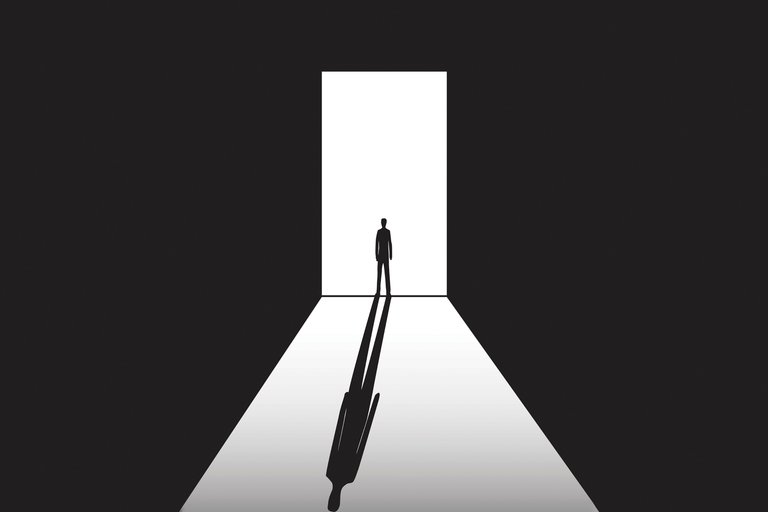
The difficulty we face when dealing with self-destructive behaviors comes from our tendency to perceive it as the core problem while overlooking the fact that it is no more than symptoms of more deeply rooted problems.

I had that childhood friend whom I closely witnessed the development of his addiction from seemingly normal child to a disturbed adolescent to our mutual friends calling to complain about him frequently asking for money.
I can’t see the change of his personality apart from the escalating conflict between his parents, especially with the involvement of their families with each group constantly demonizing the other, and with daily outbursts of anger forcing neighbors to check out on them. He had been developing a flawed mindset and a distorted worldview. No reasoning or advice from my side was able to change the way he perceived things. Later, I realized that his mindset had been perfectly aligned with the reality he had been living, and any advice that hadn’t been aligned with his personal experience could never make sense to him.
Meanwhile, he made new friendships, with almost all the addicts in the city. He introduced me to some of them, which had been his preferred group. It had been obvious that it is where he felt much appreciated or let’s say at home. Some of them were into addiction more than the others, they were more enthusiastic about drugs, they had been leading and encouraging the rest. With each of them having his own story, the most influential one had been the older son to an imprisoned father who had had to sell their house to pay his debts.

A neighbor who suddenly lost her husband few years ago, to take the responsibility - along with her mother - of raising three children. After losing his father, the middle child who had been 10 years old started showing aggressive behavior, little engagement with his class-mates and low grades. On the few occasions I met them, it was obvious that there was a serious problem. The mother was forcing the child to do almost everything she believed he must be doing. Once we started chatting they didn’t stop ranting about his rebelliousness. When I suggested consulting a psychologist they turned their faces away. My neighbor and her mother are extremely religious and self-righteous that keep telling others what to do with their lives. I believe having a boy with these traits had extremely hurt their egos.
Two years ago, I learnt that the mother had thrown the boy out after knowing he had been on drugs.

It is counter-intuitive that someone would voluntarily hurt himself. We all born with a strong instinct not only to protect ourselves but also to thrive. The question is what takes one to act against his innate tendencies?
In their article Origins of addictive behavior: evidence from a study of stressful childhood experiences NCBI stated:
A population-based analysis of over 17,000 middle-class American adults undergoing comprehensive, biopsychosocial medical evaluation indicates that three common categories of addiction are strongly related in a proportionate manner to several specific categories of adverse experiences during childhood. This, coupled with related information, suggests that the basic cause of addiction is predominantly experience-dependent during childhood and not substance-dependent. This challenge to the usual concept of the cause of addictions has significant implications for medical practice and for treatment programs.
And in “Childhood origins of self-destructive behavior”, they Concluded:
Childhood trauma contributes to the initiation of self-destructive behavior, but lack of secure attachments helps maintain it. Patients who repetitively attempt suicide or engage in chronic self-cutting are prone to react to current stresses as a return of childhood trauma, neglect, and abandonment. Experiences related to interpersonal safety, anger, and emotional needs may precipitate dissociative episodes and self-destructive behavior.
Engagement of self-destructive behavior provides episodes of relief and even pleasure to those who suffer chronic psychological pain. Failure to heal the pain, expressing it or finding its root cause leaves one desperate to find a relief. If a certain behavior is tested and proved effective in soothing the pain it would be difficult to let go.
This leaves us with the fact that self-destructive behavior is a coping mechanism for a chronic unhealed pain the person engaged can’t effectively deal with, admit, or unaware of its connection to his behavior.
While Trying to heal the behavior apart from getting to and healing its root causes is not healing at all. It is like trying to deal with the consequences of smoking without quitting in the first place.
A serious trauma or something perceived as less painful like excessive criticism, violating personal privacy, or undermining the free will are examples of pain inflicted upon the child. Since we are born with differences in how we perceive the world and since we are not prone to feel emotions with the same intensity, no one can determine for someone what is not painful or what is not except by asking him.
As most of those engaged in self-destructive behavior follow society in perceiving their behavior as the core problem. It is important to let them know that it is not and they better look within themselves to address their own root causes, and to take responsibility for their negative feelings in order to heal them.
Healing one’s own self is always easier said than done. It requires time, space and energy. Most of us understand the fact that it is a process of exploring, aligning, trying and redoing all again and again. That is why the individual and those who are close to him need to understand that it is not a matter of results but one of looking back at reasons. It is more of a journey that can’t be rushed, measured or judged. And no one can lead the journey but the person himself.
